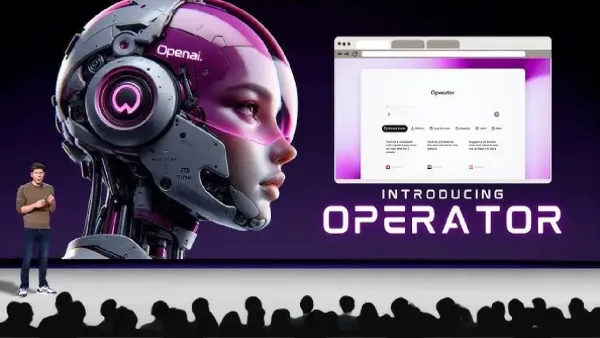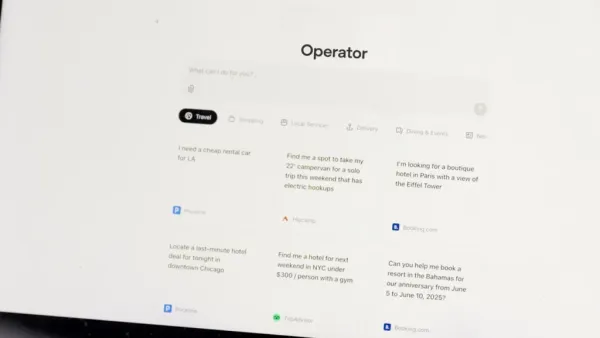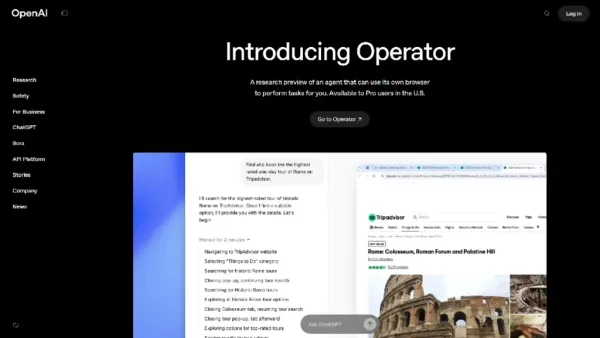

OpenAI’s latest experiment in artificial intelligence is more than just a software feature—it’s a signal that the age of hands-free internet interaction is arriving faster than expected. With the introduction of Dominate Web Tasks Using OpenAI’s Operator Assistant, a browser-based AI agent designed to carry out online tasks on behalf of users, OpenAI is pushing the boundaries of what AI assistants can do. From scheduling appointments to filling out forms and browsing websites, Operator represents a move toward self-directed AI agents that can directly work through the internet as if they were human users.
Operator’s capabilities, though still in its infancy, are hard to overestimate. This is not merely a question-answering or content-generating tool. It’s an agent that acts.
Operator is a new assistant developed by OpenAI that works directly in a web browser. Unlike traditional chat-based models such as ChatGPT, Operator is capable of interacting with websites as a human would—clicking buttons, filling in information, navigating dropdowns, and performing tasks across services.
What differentiates Operator is that it can grasp the context of a page, retain memory between steps, and decide how to perform an action. For instance, if you asked it to reschedule an appointment with your doctor, it would be able to find the appointment page, enter saved credentials to log in, go through the calendar, and enter the new date—all without you moving a muscle.
When it launches, Operator will launch as an early research preview to a limited number of users of ChatGPT Pro in the US. That gradual rollout allows OpenAI to watch how users interact with it in real-world settings, solicit feedback, and tweak its performance before launching it to more people.
Until recently, most AI was reactive. You prompt, they respond. Even the most sophisticated large language models, such as OpenAI’s GPT-4, were limited to being within the realm of conversation or content creation.

Operator shifts that paradigm entirely. It is one of a new generation of agentic AI, where systems aren’t merely responding to prompts but are being proactive to execute tasks across digital interfaces.
This change has enormous implications. It shifts AI from a productivity booster to an agent that can act on your behalf, represent you, and get things done on the internet. It also starts closing the gap between conversational intelligence and useful automation.
The most obvious use cases for Operator are in repetitive or time-consuming online activities. Consider things such as:
Currently, all this work still needs direct human intervention. Even when we have password managers or autofill capabilities, someone must still press the buttons and steer the process. Operator brings in the hope that AI can handle all this work end-to-end with minimal, if any, intervention.


To companies, this might translate to unloading the administrative burden on AI. To humans, it might mean more time away from digital niceties.
Although the public details are still limited, Operator appears to function using a combination of OpenAI’s language models, browser APIs, and task-oriented memory. It interprets the structure of a webpage, identifies elements it needs to interact with (buttons, text fields, navigation bars), and makes decisions based on what it sees.
This is done through live observation of the page structure, interpreting error messages or success cues, and adjusting the flow. That’s a step up from static automation scripts or bots based on expectant layouts and actions.
The really interesting thing about Operator is that it doesn’t stop at pre-defined workflows. It can generalize—learn to do something on one site, then apply the same logic elsewhere.
With such capability comes new issues. Allowing an AI agent to freely surf the web and act poses serious security, privacy, and intent-matching questions.
As an example, how does Operator manage sensitive operations such as entering credit card numbers or logging into accounts? What prevents it from misuse? And how open is the system regarding what it’s doing for the user?


These are issues OpenAI seems to be taking seriously. By rolling out the platform in a limited fashion and calling it a research preview, the company is framing Operator as a work in progress, not a finished product ready for widespread adoption.
It’s also the latest move in a larger initiative in the AI community to make sure that systems with agency are not only interpretable but also controllable. As AI starts to act on users’ behalf, the necessity for control and ethical boundaries is more important than ever.
Operator is not merely a product feature. It’s a milestone to a future where AI is no longer an observer but a participant in the digital world.
That change has profound implications. Developers will have to think differently about user interfaces, aware that their pages are being accessed by both people and smart agents. Businesses might need to think about how their services allow for autonomous interaction, particularly in terms of rate-limiting, session management, and consent.


It also influences how we conceptualize user intent. Whereas conventional automation depended on dry, rule-based pipelines, applications such as Operator employ probabilistic reasoning and language-driven interpretation to accomplish things. That brings us to more malleable, individualized user experiences—but also makes behavior more difficult to anticipate.
OpenAI is not the only game in town. Google and Anthropic are also developing AI agents that move past chat—and into browsers, devices, and operating systems. But with Operator, OpenAI is making its vision central: AI that acts, not merely reacts.
If Operator ultimately succeeds, however, it might remake our relationship with the internet. Rather than browsing through a dozen tabs, entering fields, and clicking through verification pages, we might instruct our assistant to do what we need and let it deal with the details.
It’s the kind of interaction paradigm that was science-fiction-ish even as recently as a handful of years ago. Now, it looks like the next obvious step.
Operator is in very early testing, and it’s hardly a polished product. But even in its rough state, it’s a compelling vision: that AI can be not only a useful voice in a box, but a complete digital co-conspirator that actively labors on your behalf.


As OpenAI continues to improve the assistant and push it to its limits, Operator could indeed form the foundation of a new web experience—one that is less about clicks and more about goals, less about interface and more about results.
In that future, browsing won’t be about navigating—it’ll be about delegating.